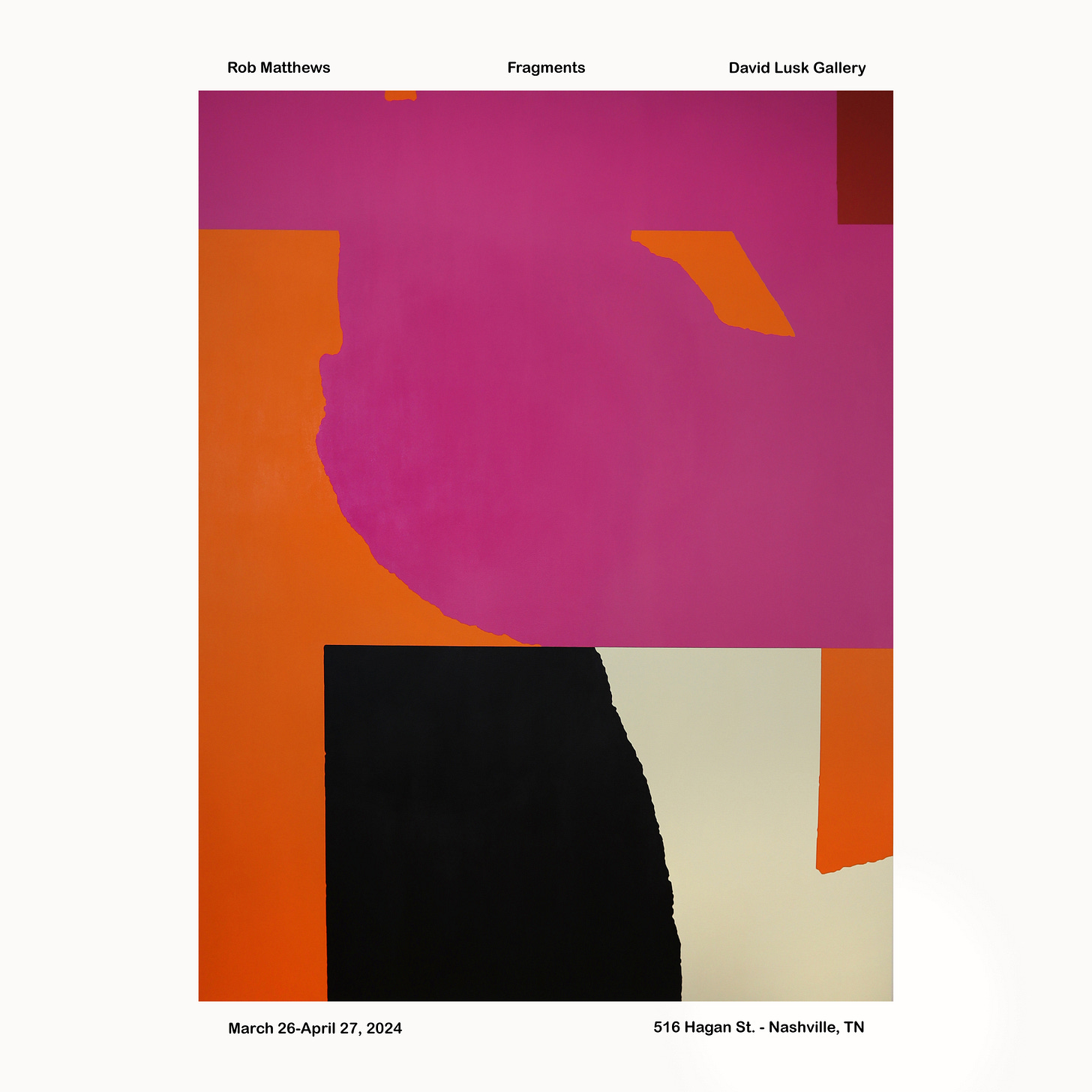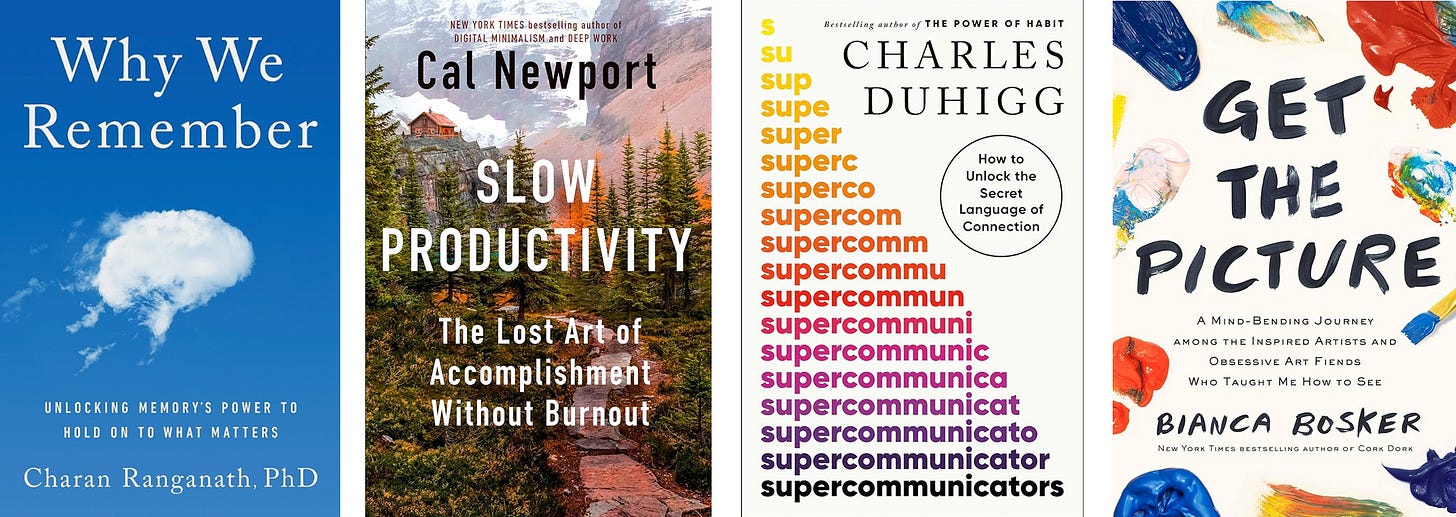My latest show, Fragments, opens at David Lusk Gallery in Nashville on Tuesday, March 26. It feels like I have been waiting for this week to arrive for a long time. I finished the work right before Thanksgiving last year. I spent several years working until the last minute for shows, convincing myself that the most recent piece would be the best. This was never true. The worst it ever got was when I still lived in Philadelphia. I finished a drawing, drove it to the framer, waited for it to be framed, drove it to New York, and installed it before that night’s reception. I might have considered this risky behavior, but years before, I had helped install a show by an established, well-known painter. As we started to hang the work, the installers were told, “Every painting is still wet, even on the sides. She was still painting while they were crating up the work.” I have a better work/life balance. Those days should be behind me.
Fragments runs from March 26 to April 27. I am scheduled for a gallery talk on Saturday, April 6, at 3:00. Here is the statement I gave the gallery. I have not seen the official press release:
James Rosenquist called the brain a “collage machine.” Our brain cannot recall an uninterrupted progression through a day. At best, it offers a collection of images, and we turn that into a story, hoping we put those images in the correct order. Expanded further, we hope to keep the events of one year separate from another without conflating them. The collage machine is more interested in bringing distant memories closer together to amplify meaning than it is in maintaining linear continuity.
—-
I used to play music in the drawing classes I taught. There was so much disagreement among the students about what to play that I switched to podcasts. That decision eliminated the arguments, but it created an unexpected problem. One day, during the second podcast of the class, a student grabbed her head like a person having a nervous breakdown in a movie, yelled out, “This is too much narrative!” and ran from the room. She was correct. She was correct, and it was only 2009. I cannot imagine how overwhelmed she must be now with the further expansion of narrative podcasting, YouTube content, and streaming services. I hope she has a flip phone and no Wi-Fi in her home.
—-
Collage has been a generating force in my process for over a decade. The only thing to change is what has been collaged. Any piece of paper is up for grabs: photographs, books, magazines, scrap paper, or drawings. The collage material for this work was a set of ink drawings that I cut down and reordered. The subject matter of those drawings is important to me but irrelevant to the viewer. I heard Yo La Tengo playing a live set on a radio station last year. The radio host said, “You’re getting ready to play a new song. Can you tell us what it is about?” Ira Kaplan said, “Absolutely not,” and began the song. There is too much narrative.
—-
On the first day of my first painting class, my professor reviewed the materials needed for the semester. He ended the discussion with what we would need to clean our brushes. He held up a bottle of dish soap and said, “Get yourself some (bleeping) Joy.” That simple statement has been a mantra in the studio for the past two years. These recent works became opportunities for meditation. Each piece allowed me to reflect on a fragment of time, be it good or bad. If it was a good memory, the painting was made in celebration. Negative memories were confronted and reclaimed. The impetus may be positive or negative, but the intended result for each painting is joy.
The viewer does not need the story behind each of these works. I once stood by a friend as he cried before an AbEx painting. That first-year painting professor told us of crying in a room of Suprematist paintings. Those reactions were on them. They brought that baggage to the
museum. Every person who walks into a gallery or a museum brings all of themselves along for the ride. Bring what you have, but get yourself some joy.
Books
I have not finished many books in the past month. I completed Charan Ranganath’s Why We Remember. Ironically, I do not remember much about it.
I started Cal Newport’s Slow Productivity, but it felt like I was the choir he was preaching to, so I only got about halfway through it. My 7th-grade reading teacher said you should give every book at least 100 pages. I managed that.
I am halfway through Charles Duhigg’s Supercommunicators, which I feel compelled to finish if only to find out if there is more to this book than teaching people how to be empathetic and pick up on emotional cues in a conversation. I get that this is necessary. I just did not realize that we had slipped so far as a culture that a person needed to be taught that other people have emotions. Hopefully, the back half of the book will dive further. Right now, the book is geared toward recognizing people’s feelings and manipulating them.
I just started Bianca Bosker’s Get the Picture. Bosker is a journalist and New York art world “outsider” who spent a lot of time and energy trying to see what it was like to be an “insider.” The opening tone is snarky and dismissive, but the book appears structured to give way to an understanding and appreciation of some elements of the art world. If she fully embraces it by the end, then I will probably feel more sorry for her than anything. You need to keep your b.s. detector cranked to a high degree of sensitivity as you negotiate that world. You do not have to buy the whole cow.
Music
My dive into new music has been about the same as my dive into new books. Not much has jumped out at me. I tried some pop and singer-songwriter albums, but nothing stuck. Here are a few new albums:
Klaus Mäkelä and Orchestre de Paris - Stravinksy’s Pétrouchka, Debussy’s Jeux, Prélude À L’après -Midi D’Un Faune
Sasha Renkas - Safe Place
Jack Silverman Quartet - Prince of Shadows
David Riddell and The Danish Sinfonietta - Anders Koppell Chamber Concertos
Movies
I knocked out several Oscar nominees and late 2023 movies.
Dream Scenario - Great first and second acts. It nosedived after that. It was disappointing, but I could not have figured out a satisfactory third act if you put me on the writing staff.
Anatomy of a Fall - I doubt I will ever see this movie again, but it was a great piece of movie-making. Sandra Hüller was the best actor of 2023. Between her performance in this movie and The Zone of Interest, I hope some film institutions pause to acknowledge these two performances. Both performances are incredible, no matter the circumstances. But that her Zone performance is delivered in German and her Anatomy performance is delivered in French and English makes my brain fizzle a bit. Aside from Hüller, there is no weak link in Anatomy. The boy who played Hüller’s son, Milo Machado-Graner, deserved a supporting actor nomination.
Poor Things - Visually stunning and deserved every production Oscar it won. Emma Stone’s barely perceptible transition from a woman with a toddler's brain to an intelligent adult is remarkable, so it is easy to see how she won the Oscar, but I would have voted differently. The movie itself? Eh.
Dune 2 - Similar to Oppenheimer, this movie deserves to be seen in 70mm. Thank you, Opry Mills. I liked Dune. It was a well-sculpted Shakespearean take on a difficult book to turn into a movie. Dune 2 is a step beyond—one of the few sequels to surpass the first movie.
Perfect Days - My favorite two movies of the past year have been Oppenheimer and Perfect Days. They could not be more different in scale. Wim Wenders is my favorite director. He disappoints me more than any other artist I like, but he keeps me coming back because I know he has the potential to drop a masterpiece at any moment. I will watch four bad Wenders movies to get to that good one. A 20% masterpiece success rate is entirely acceptable. I am such a deliberate creature of routine that this movie hit hard.
If you made it this far, thank you for reading. I will be back in April.







